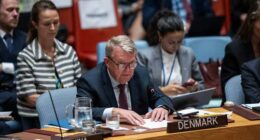Share this @internewscast.com
Unlock the Editor’s Digest for free
BP has expanded its share buybacks after the oil major reported its second-highest annual profit in more than decade, as new chief executive Murray Auchincloss attempts to keep investors on side.
The results are the first since former chief financial officer Auchincloss was confirmed as BP’s chief executive in January, four months after his predecessor Bernard Looney resigned for failing to fully disclose past relationships with company colleagues
BP made underlying profits of $3bn in the final three months of the year, exceeding analyst estimates of $2.8bn, and taking earnings for 2023 to $13.8bn.
Although down by half from the record of $27.7bn set in 2022, when soaring fossil fuel prices delivered bumper profits across the industry, BP’s earnings in 2023 were the second-highest since 2012.
BP shares opened up 5 per cent in London on Tuesday.
Auchincloss has pledged to stick with the strategy, spearheaded by Looney, to transform BP from an oil and gas producer into an integrated energy provider by cutting fossil fuel production and investing in green technologies.
The Canadian executive on Tuesday said that BP’s destination was unchanged but sought to emphasise that BP would get there as a “simpler, more focused and higher-value company”.
Since taking over at rival Shell last year, chief executive Wael Sawan has also sought to simplify Shell’s business. Both companies are trying to close a yawning valuation gap with US rivals by demonstrating that they can continue to generate healthy profits even as they invest in green energy.
BP on Tuesday left its dividend unchanged and announced $1.75bn in share buybacks. BP, like most of its rivals, has used bumper profits from the past two years to embark on a huge share repurchasing scheme.
The company outlined a commitment to buy back $3.5bn in shares during the first half of the year and at least $14bn in stock over 2024 and 2025.
BP also narrowed its spending guidance, announcing planned capital expenditure of about $16bn in both 2024 and 2025, compared with a previous target of $14bn-$18bn a year.
While BP’s transformation plan has won the support of some shareholders and many employees, it is yet to fully convince investors. BP has trailed behind its main rivals in terms of total returns to shareholders over the past four years.
In October, activist investor Bluebell Capital Partners wrote to Auchincloss and to chair Helge Lund, calling on the board to ditch a commitment to cut oil and gas output as well as other key parts of the strategy, the Financial Times reported last week.
BP’s net debt fell to $20.9bn, the lowest level in a decade, down from $23.7bn at the end of June.





